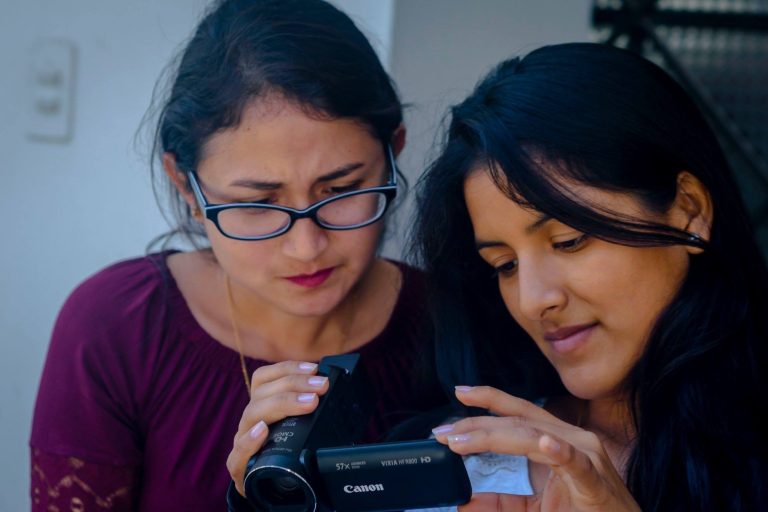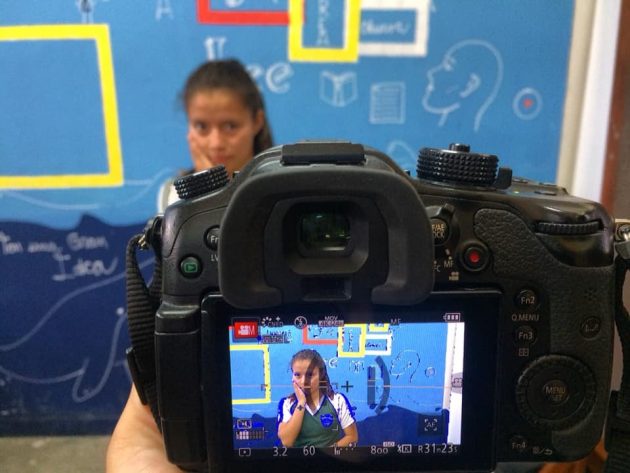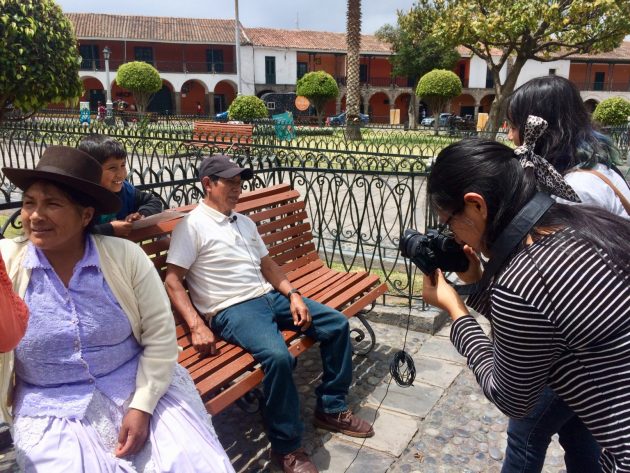
EmpoderArte Uses Film to Empower Peruvian Women
27 February, 2021This article was originally published by Sounds and Colours’ partner, Latin American Bureau. You can read the original here.
Social arts organisation EmpoderArte is run by Karoline Pelikan, LAB’s film editor and director of Cine Latino and Pelikan Pictures. Having won important funding from Peru’s Ministry of Culture, Gianna Giordani finds out more about the organisation and its plans for the future.
German-Peruvian film-maker Karoline Pelikan sees female empowerment and creativity as the key to enriching and diversifying film-making and cultural production. As founder and cultural manager of EmpoderArte, a Peruvian-based NGO which offers a decentralised film education to women, Karoline organises and runs workshops up and down the country, mobilising hundreds of women to discover and embrace the emancipatory power of storytelling.

EmpoderArte’s ethos
Karoline explains that EmpoderArte has two principle aims: “Decentralising film education […] and getting more women to tell the stories they want to tell.” The goal is not to shape the new film-makers of tomorrow but rather, to create a safe space for women of all backgrounds to explore a plethora of issues – from abortion to domestic violence to attitudes towards women in sport.
EmpoderArte’s raison d’être, Karoline expresses, is to show women, particularly those from disadvantaged backgrounds, “how powerful they actually are”, a realisation she hopes participants “will share with their children, their sisters, their families, with everyone.”

With social justice and gender equality at the core of every workshop, project and film, EmpoderArte’s message is clear: film is a powerful social and political tool. EmpoderArte brings to light the inherently political nature of all artistic output, especially that of bringing personal, often painful narratives into the public domain and demanding your voice to be heard.
EmpoderArte in action – Goal (2020)
Karoline cites the example of Goal, a short film produced in one of EmpoderArte’s workshops this year in Trujillo. The film follows Sandra, an inspiring 13-year-old who is passionate about football, and who is learning to overcome gender discrimination in her everyday life.
Sandra’s determination to play football and break down gendered stereotypes resonated with EmpoderArte’s participants in other regions of Peru. “Suddenly we had this conversation in Huamanga,” Karoline explained. Sandra’s story prompted other women to recognise and reconsider the struggle of footballers and activists they knew, and to converse about women and girls’ place in sport.
The film highlights a shared struggle against patriarchal structures and traditions. Seeing aspects of your life presented back to you via the experience of another on screen is a powerful and unifying experience, Karoline attests. The beauty of this short film was the conversation it sparked and the visibility it brought to women in sport.
The democratisation and decentralisation of film-making
DAFO awards funding to organisations which are successful in contributing to the decentralisation and democratisation of cultural production in Peru. EmpoderArte offers workshops to all Peruvian women, not just those in Lima. In moving away from the capital, women from even the most remote regions of Peru are given the opportunity to critically engage with and produce noteworthy stories.
When it comes to the democratisation of cultural production, Karoline says how “the same participants who have been taught [by EmpoderArte] take this and make it theirs and then teach other women from the same community.” It is about creating a network in which women teach other women.
For Karoline, the workshops are a “participatory project” which differs from a conventional film education which, in many cases, is hierarchical and exclusionary. Karoline explains how film-making remains grounded in patriarchal structures, in which “the director is God, the producer is God and that’s it.”
What the funding means for EmpoderArte
This year, EmpoderArte has received funding from the Peruvian Ministry of Culture, ensuring secure financing until 2022. The funding, awarded by the Dirección del Audiovisual, la Fonografía y los Nuevos Medios (DAFO) will allow EmpoderArte to continue the noble work they carry out, helping shape Peruvian society for the better.
In the past, Karoline explains how she used to receive sporadic funding for equipment, as well as donations from film-makers and friends “who believed EmpoderArte was truly necessary” and would therefore help with costs. Now, however, there will be equipment available in Trujillo, Huamanga and Cusco, which will stay with the cultural managers in each region.
With funding secured, the organisation can ensure that workshops are free for all participants, even during economically challenging times, and not be at a loss as a result. Given the Coronavirus pandemic, all workshops will be virtual for the foreseeable future.
Although travelling is currently not possible, DAFO funding will give many women the opportunity to travel in future to different places in Peru. “Most of them [EmpoderArte’s participants] have never been out of their region and they would love to,” explains Karoline, citing the example of one girl who lives in a small village in the Andes and whose dream is to see the sea. Before the pandemic, Karoline was planning on bringing her to Trujillo, a coastal city in north-western Peru. Hopefully this will be made possible in the coming months.
Alongside the obvious benefits of funding, Karoline also speaks of what it means to have your work recognised and deemed worthy of remuneration. “Everything I see in this project finally gets merit,” expresses Karoline.
Film-making during Covid-19
Like virtually all of the arts industry worldwide, the Covid-19 pandemic has forced EmpoderArte to diversify its methods. With no in-person workshops, teaching filmmaking has become a virtual exercise for Karoline which, although far from ideal, remains within the scope of possibility. “You just have to change the ideas in the end, you have to adapt to the situation,” explains Karoline, who remains optimistic about the future.
Life in a pandemic has also brought to light some important considerations about the nature of relations and face-to-face contact. Only being able to communicate via a screen can make us feel isolated and out of touch; for Karoline, this has encouraged her to look at the introspective value of film-making and creativity. One of the films she produced during lockdown was supposed to be about EmpoderArte, trying to capture the idea of empowerment through film. “Then the pandemic happened,” says Karoline, and thus the project turned into a film in which Karoline questions her identity as a film-maker and what motivates her.
For EmpoderArte’s participants, many have also chosen to dive into different modes of artistic expression: writing about films instead of making them has become an interesting path for several women, as has designing websites and online magazines.
In talking to Karoline, we see how EmpoderArte continually challenges and disrupts the deep-seated patriarchal mechanisms in play both in filmmaking and in wider society. In giving women a platform to share their stories and experiences, we ought to consider the organisation’s work in light of the second-wave feminist slogan, “The Personal is Political.”
Social arts organisation EmpoderArte is run by Karoline Pelikan, LAB’s film editor and director of Cine Latino and Pelikan Pictures. To know more about the project: Facebook and Instagram.
Follow Sounds and Colours: Facebook / Twitter / Instagram / Mixcloud / Soundcloud / Bandcamp
Subscribe to the Sounds and Colours Newsletter for regular updates, news and competitions bringing the best of Latin American culture direct to your Inbox.

